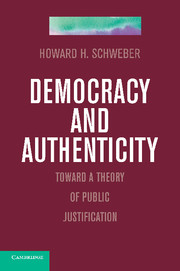Book contents
- Frontmatter
- Contents
- 1 Introduction
- Part One The Case for Constraint
- 2 Three Versions of the Case for Constraint
- 3 Subjective Standards and the Problem of Deliberative Perfectionism
- 4 Liberalism and the Problem of Authenticity
- 5 Further Reflections on Authenticity
- 6 The Scope of Constraint
- Part Two Responding to the Case for Inclusion
- Bibliography
- Index
- References
2 - Three Versions of the Case for Constraint
Audi, Rawls, and Larmore
from Part One - The Case for Constraint
Published online by Cambridge University Press: 05 November 2011
- Frontmatter
- Contents
- 1 Introduction
- Part One The Case for Constraint
- 2 Three Versions of the Case for Constraint
- 3 Subjective Standards and the Problem of Deliberative Perfectionism
- 4 Liberalism and the Problem of Authenticity
- 5 Further Reflections on Authenticity
- 6 The Scope of Constraint
- Part Two Responding to the Case for Inclusion
- Bibliography
- Index
- References
Summary
Arguments for constraints on public reason or public justification proceed directly from core values of consensus liberalism. In particular, arguments for constraint appeal to a dimension of equality captured in the phrase “equal respect.” In the Introduction, I proposed that the kind of equal respect that is central to consensus liberalism is a presumption of equal competence as a moral reasoner. Another way of conceptualizing this kind of respect is in terms of an equality of legitimacy, the presumption that one individual's personal interests, preferences, and beliefs cannot be treated as less legitimate than another's. Legitimate, obviously, does not mean successful; there is nothing in liberalism that requires that all citizens’ claims be satisfied to an equal degree. The assertion is only that no assertion of interests or outcome preferences can be dismissed because of the identity of the person asserting it.
It might appear paradoxical to argue that the requirement that all citizens’ views of the world be taken equally seriously leads directly to a case for constraint on the articulation of those views in political contexts. That paradox, however, is only apparent. In truth, the case for constraint is squarely grounded in the values of consensus liberalism. To take only one example, the idea that there are limitations on what counts as an acceptable justification for law making has played a central role in American constitutionalism. The first and most basic constraint on the actions of government that is imposed by the U.S. Constitution – at least after the adoption of the 14th Amendment – is the requirement that the state provide valid justifications for its actions. “Arbitrary” or “purposeless” limitations on liberty are presumptively unconstitutional. The theory is that the phrase “due process of law” applies to law making as well as law enforcement, and that the most basic requirement of due process in law making is that we owe other reasons for employing the coercive power of the state. “Because I say so” is the logic of a tyrant; “because we, the majority, say so” is the majoritarian tyranny that Madison feared. In Cass Sunstein's happy phrase, the rejection of arbitrary law making of either sort marked the establishment of a “republic of reasons” (Sunstein, 1993: 20).
- Type
- Chapter
- Information
- Democracy and AuthenticityToward a Theory of Public Justification, pp. 33 - 67Publisher: Cambridge University PressPrint publication year: 2011



